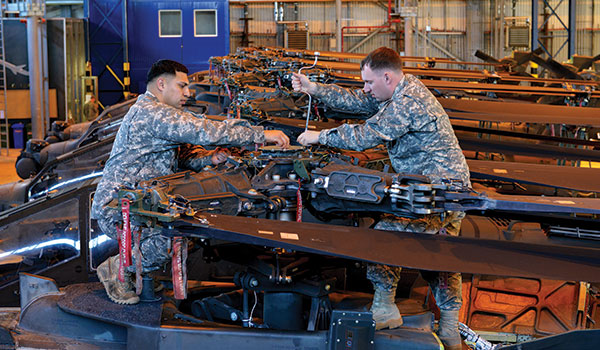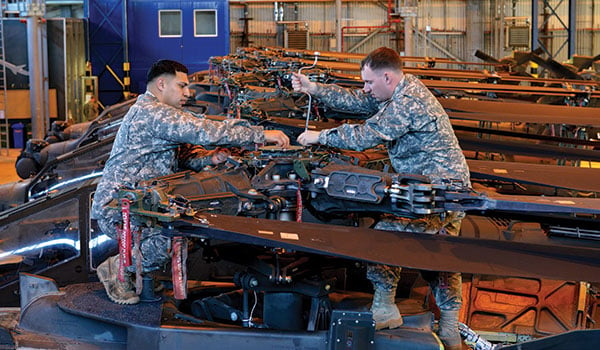
AMCOM Command Sergeant Major / By CSM Glen Vela: As I travel and talk with aviation Soldiers and NCOs, I continue to notice a common theme. The departure from green suit led aircraft maintenance.

An Aviation noncommissioned officer coaching, teaching, and mentoring an enlisted Soldier on maintenance procedures / U.S. ARMY PHOTO
Let’s start by realizing that we have challenges with providing adequate maintenance training and development to an entire generation of leaders. This has resulted in Army Aviation becoming far too reliant on contract maintenance; moreover, it has directly impacted the development of our Non-Commissioned Officer (NCO) Corps which will impact our branch for years to come.
There are good reasons as to why we’ve become too reliant on contract maintenance. Over the last decade OPTEMPO, RESET, and Force Manning Level (FML) constraints have all affected the training of our maintainers. But the question that faces us now is, “What are we going to do about it?” It starts with Leaders identifying the size and scope of this problem. Leaders at all levels need to take a step back, look at the maintenance process and periodically ensure we’ve got it right. If not, develop a plan, move out, and fix it.
Fix What You Can
First, leaders in the field need to take responsibility to fix what they can. Professional Military Education cannot solve this problem alone. Over the last decade we’ve streamlined courses and greatly reduced the length of time Soldiers spend in the institutional training environments. CSM Chambers (U.S. Army Aviation Center of Excellence) is currently conducting a bottom up review of our Military Occupational Specialties (MOS) to ensure we’ve gotten the TRADOC piece right. We have to realize upfront, time will always be our enemy when using institutional Army training. Due to a multitude of reasons, there is not enough time to train everything that we would like to. Consequently, Army Aviation relies heavily on units through operational assignments and self-development to give Soldiers the necessary skills to operate effectively.
Training Plan
Second, leaders need to deliberately plan maintenance training. Training takes time and resources to accomplish and it’s no different for training Soldiers on maintenance tasks. Are we putting maintenance training on the calendar? Do we have training objectives defined and have we certified our trainers? Are we training the right Soldiers on the right tasks? Those questions are easier to ask than answer, which is why it is so important. A word of caution – too often in the past we’ve paid lip service to maintenance training by putting it on the schedule but then really just using that time to get another inspection or test flight done. It’s easy to do this, but by doing so we are hurting ourselves in the long run. As leaders, we need to ensure maintenance training gets the same level of planning that an air assault or deliberate attack does. Your Logistics Assistance Representative (LAR) can assist you in the process – utilize them. The stakes are high as if we don’t, our commanders may not have the aircraft needed to conduct that air assault or deliberate attack.
Tech and Leader Development
Third, we need to invest in both the technical and leader development of our Soldiers. As the complexity of our aircraft continually increases, so does the complexity of our maintenance procedures. For some of our technical skills, repetition in repeating a task can aid a Soldier in their proficiency. For many tasks, you can send Soldiers to Corpus Christi Army Depot to work with master artisans to gain repetition. Other tasks require in-depth knowledge of systems in order to troubleshoot appropriately. AMCOM can assist you here too by providing seats in LAR-University – the same training that your LARs receive. Regardless of where your Soldiers receive individual developmental training, it is critical that leaders have a plan. It will not happen on its own, and none of us want to pass along an untrained Soldier to the next unit.
Finally, we need to train as we fight. If called upon to deploy to an immature theater, we need to be able to organically sustain ourselves. Attaining that capability and proficiency does not happen by itself. Can we pick up and move our Prescribed Load List (PLL) and Authorized Stockage List (ASL)? Have we practiced it? From a sustainment perspective, our maintenance Soldiers need to be prepared to execute all tasks. I’d urge you to take a look at your formations and determine what work we are giving to contractors. While it may be efficient to always give them certain inspections or tasks, we are mortgaging our future if we fail to provide the experience to our own Soldiers. The AMCOM Logistics Readiness Center – Aviation (LRC-As) (formerly the Director of Logistics (DOL), provide great pass back maintenance capability, but over-reliance on them will degrade your combat readiness.
The Future
From TRADOC’s description of the future operating environment, it is clear that our branch will need to be more flexible and adaptable than ever before. As the operating environment continues to change and evolve, our Soldiers and leaders too must be agile in adapting to new environments. Consequently, the enterprise must begin to adapt now in order to train our Soldiers and leaders for the future.
The complex future environment will require access to subject matter expertise to conduct repairs of intricate systems at the point of need. Training and certification programs must be hosted in an online environment where not only unit managers can track but Branch and Human Resources Managers have access to manage talent. Currently, the Branch is working towards a training model for maintainers that would parallel the aviation aircrew member Readiness Level progression process. If we do this right, it will not only ensure we are investing in our force by providing the right training when needed to meet mission requirements, but also aid in placing the right people in the right jobs.
I believe that leaders at all levels are committed to ensuring that Army Aviation has the resources necessary to provide the training of our force. We must except this opportunity, this challenge and move forward to address and correct the maintenance training deficiencies within our ranks. For the more we sweat in peace, the less we bleed in war.
Above the Best and Army Strong!
CSM Glen Vela is the command sergeant major of the Aviation and Missile Life Cycle Management Command at Redstone Arsenal, AL.







